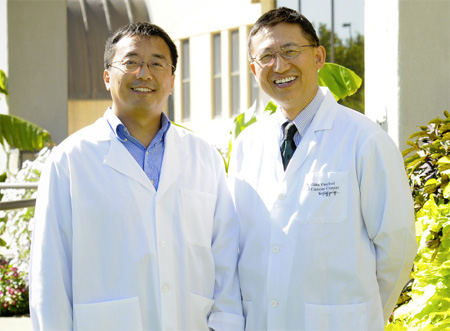Home > Press > Researchers Unveil Method for Detecting Lung Cancer in Nature Article: Nanotechnology sensor could lead to earlier diagnosis for world's deadliest form of cancer
 |
| Michael Wang, MD, PhD, right, assistant professor of pathology and anatomical sciences, and Li-Qun Gu, PhD, associate professor of biological engineering, have developed a new technology for the early detection of lung cancer. Worldwide and in the United States, lung cancer is the most common cause of cancer-related death. |
Abstract:
When lung cancer strikes, it often spreads silently into more advanced stages before being detected. In a new article published in Nature Nanotechnology, biological engineers and medical scientists at the University of Missouri reveal how their discovery could provide a much earlier warning signal.
Researchers Unveil Method for Detecting Lung Cancer in Nature Article: Nanotechnology sensor could lead to earlier diagnosis for world's deadliest form of cancer
Columbia, MO | Posted on September 15th, 2011"Early detection can save lives, but there is currently no proven screening test available for lung cancer," said Michael Wang, MD, PhD, assistant professor of pathology and anatomical sciences at MU and a corresponding author for the article. "We've developed highly sensitive technology that can detect a specific molecule type in the bloodstream when lung cancer is present."
Worldwide and in the United States, lung cancer is the most common cause of cancer-related death. In the U.S., more than 221,000 people will be newly diagnosed with lung cancer in 2011, and more than 155,000 people will die from the disease this year.
MU researchers used blood plasma samples to detect a change in a specific small ribonucleic acid (microRNA) molecule that is often elevated in lung cancer patients. The scientists put an extract of blood plasma through a protein-based nanopore, which is a tiny hole in a thin membrane that is just big enough for a single molecule to pass through. By applying an ionic current to the nanopore, the scientists measured changes in the current that occur when the microRNA molecule associated with lung cancer is present.
"That altered current acts as a signal or bio-signature that is related to lung cancer," said Li-Qun Gu, PhD, an associate professor of biological engineering at MU and a corresponding author for the article. "Our new nanopore sensor is selective and sensitive enough to detect microRNAs at the single molecular level in plasma samples from lung cancer patients.
"While there are many research labs that focus on nanopore applications, this is the first time that nanopore technology has been used to detect lung cancer," Gu added. "This technology could possibly be used in the future to detect other cancer types as well as other types of diseases with specific DNA or RNA in the blood."
MU research published in the article was partially supported by grants from the National Science Foundation, National Institutes of Health and University of Missouri Intellectual Property Fast Track Initiative. The authors are associated with MU's College of Engineering, School of Medicine, Ellis Fischel Cancer Center and Dalton Cardiovascular Research Center.
####
For more information, please click here
Contacts:
Office of Communications
University of Missouri School of Medicine
One Hospital Drive, MA204G, DC018.00
Columbia, MO 65212
(573) 884-0298
Laura Gerding, APR
(573) 882-9193
Rich Gleba
(573) 884-0298
Copyright © University of Missouri School of Medicine
If you have a comment, please Contact us.Issuers of news releases, not 7th Wave, Inc. or Nanotechnology Now, are solely responsible for the accuracy of the content.
| Related News Press |
News and information
![]() Researchers develop molecular qubits that communicate at telecom frequencies October 3rd, 2025
Researchers develop molecular qubits that communicate at telecom frequencies October 3rd, 2025
![]() Next-generation quantum communication October 3rd, 2025
Next-generation quantum communication October 3rd, 2025
![]() "Nanoreactor" cage uses visible light for catalytic and ultra-selective cross-cycloadditions October 3rd, 2025
"Nanoreactor" cage uses visible light for catalytic and ultra-selective cross-cycloadditions October 3rd, 2025
Nanomedicine
![]() New molecular technology targets tumors and simultaneously silences two ‘undruggable’ cancer genes August 8th, 2025
New molecular technology targets tumors and simultaneously silences two ‘undruggable’ cancer genes August 8th, 2025
![]() New imaging approach transforms study of bacterial biofilms August 8th, 2025
New imaging approach transforms study of bacterial biofilms August 8th, 2025
![]() Cambridge chemists discover simple way to build bigger molecules – one carbon at a time June 6th, 2025
Cambridge chemists discover simple way to build bigger molecules – one carbon at a time June 6th, 2025
![]() Electrifying results shed light on graphene foam as a potential material for lab grown cartilage June 6th, 2025
Electrifying results shed light on graphene foam as a potential material for lab grown cartilage June 6th, 2025
Discoveries
![]() Researchers develop molecular qubits that communicate at telecom frequencies October 3rd, 2025
Researchers develop molecular qubits that communicate at telecom frequencies October 3rd, 2025
![]() Next-generation quantum communication October 3rd, 2025
Next-generation quantum communication October 3rd, 2025
![]() "Nanoreactor" cage uses visible light for catalytic and ultra-selective cross-cycloadditions October 3rd, 2025
"Nanoreactor" cage uses visible light for catalytic and ultra-selective cross-cycloadditions October 3rd, 2025
Announcements
![]() Rice membrane extracts lithium from brines with greater speed, less waste October 3rd, 2025
Rice membrane extracts lithium from brines with greater speed, less waste October 3rd, 2025
![]() Researchers develop molecular qubits that communicate at telecom frequencies October 3rd, 2025
Researchers develop molecular qubits that communicate at telecom frequencies October 3rd, 2025
![]() Next-generation quantum communication October 3rd, 2025
Next-generation quantum communication October 3rd, 2025
![]() "Nanoreactor" cage uses visible light for catalytic and ultra-selective cross-cycloadditions October 3rd, 2025
"Nanoreactor" cage uses visible light for catalytic and ultra-selective cross-cycloadditions October 3rd, 2025
|
|
||
|
|
||
| The latest news from around the world, FREE | ||
|
|
||
|
|
||
| Premium Products | ||
|
|
||
|
Only the news you want to read!
Learn More |
||
|
|
||
|
Full-service, expert consulting
Learn More |
||
|
|
||








